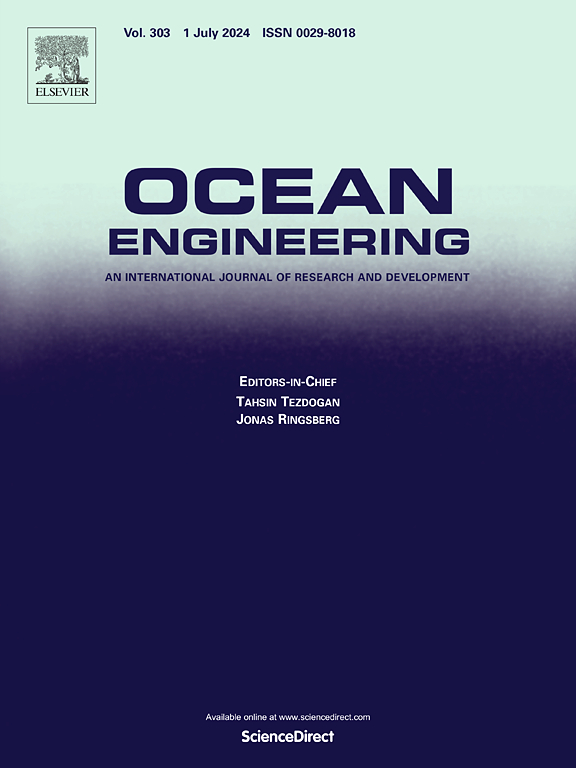An accelerated corrosion-fatigue testing method for marine high-strength steel based on equivalence principle of fatigue crack growth
IF 4.6
2区 工程技术
Q1 ENGINEERING, CIVIL
引用次数: 0
Abstract
The corrosion-fatigue test is widely used to assess marine equipment. However, due to the low-frequency and high-cycle loading of marine equipment in service, conventional test methods require long cycle times and high costs. This makes it challenging to meet the rapid evaluation demands associated with equipment development effectively. In this study, an accelerated corrosion test method was proposed for steel by adjusting the composition, temperature, pH and H2O2 concentration of environment. Fatigue crack growth tests were conducted under various corrosion environments and load frequencies. The matching relationships between corrosion fatigue acceleration multiplier, corrosion environment parameters and load parameters were established. Additionally, a corrosion fatigue acceleration test method was proposed based on the equivalent principle of fatigue crack growth. The results show that effective coupling between corrosion and fatigue can be achieved by gradually reducing the load frequency as the stress intensity factor amplitude increases throughout the crack growth process. It is consistent with the trend of fatigue crack growth rate in the seawater environment. The 4.85% fatigue life deviation and the 15.68 times corrosion fatigue acceleration can be achieved by our method. This work improves the accuracy and reliability of fatigue performance evaluation for offshore equipment.
基于疲劳裂纹增长等效原理的船用高强度钢加速腐蚀疲劳试验方法
腐蚀疲劳试验被广泛用于评估船用设备。然而,由于船用设备在使用中的低频率和高循环负载,传统的测试方法需要较长的循环时间和较高的成本。这使得有效满足与设备开发相关的快速评估需求面临挑战。本研究通过调整环境的成分、温度、pH 值和 H2O2 浓度,提出了一种钢材加速腐蚀试验方法。在不同的腐蚀环境和载荷频率下进行了疲劳裂纹生长试验。建立了腐蚀疲劳加速度乘数、腐蚀环境参数和载荷参数之间的匹配关系。此外,还提出了一种基于疲劳裂纹生长等效原理的腐蚀疲劳加速试验方法。结果表明,在整个裂纹生长过程中,随着应力强度因子振幅的增加,逐渐降低载荷频率可以实现腐蚀与疲劳的有效耦合。这与海水环境中疲劳裂纹增长速率的趋势一致。我们的方法可实现 4.85% 的疲劳寿命偏差和 15.68 倍的腐蚀疲劳加速度。这项工作提高了海洋工程设备疲劳性能评估的准确性和可靠性。
本文章由计算机程序翻译,如有差异,请以英文原文为准。
求助全文
约1分钟内获得全文
求助全文
来源期刊

Ocean Engineering
工程技术-工程:大洋
CiteScore
7.30
自引率
34.00%
发文量
2379
审稿时长
8.1 months
期刊介绍:
Ocean Engineering provides a medium for the publication of original research and development work in the field of ocean engineering. Ocean Engineering seeks papers in the following topics.
 求助内容:
求助内容: 应助结果提醒方式:
应助结果提醒方式:


